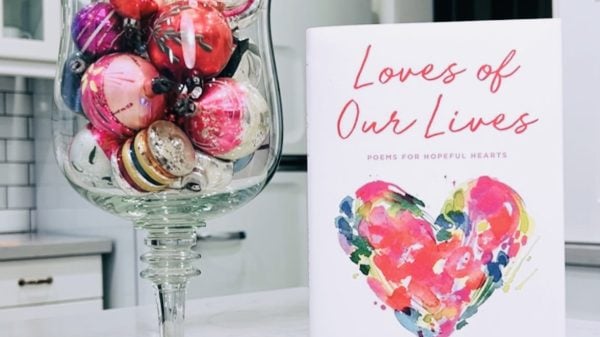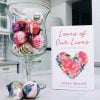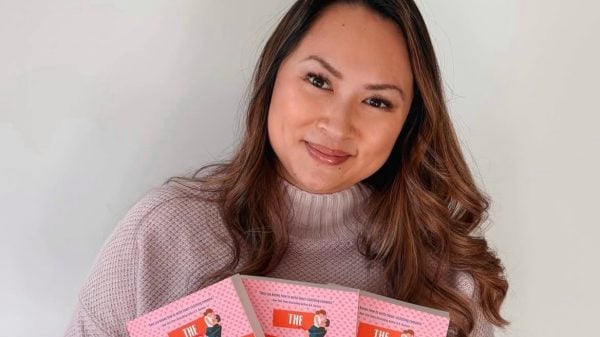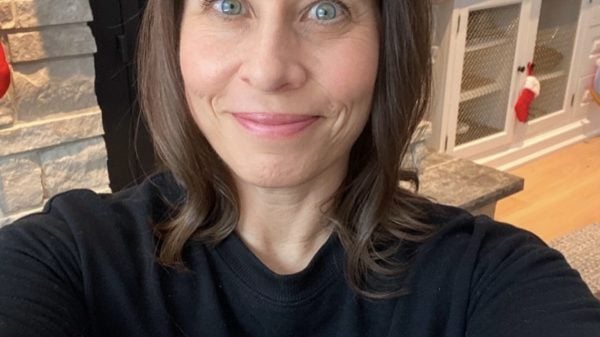Welcome to STYLE Canada‘s Boreal Book Club: a monthly meeting narrated by Erin Catto, (reviewer at Girl Well Read), for bookworms who’re looking to scour new pages. Since we aim to shine a spotlight on all things Canadian in life and style, beauty, and health and wellness, it goes without saying that every instalment of the Boreal Book Club will feature a Canadian author and their latest title. Be sure to use the hashtag #BorealBookClub to share with us on social!

Fern Brookbanks has wasted far too much of her adult life thinking about Will Baxter. She spent just twenty-four hours in her early twenties with the aggravatingly attractive, idealistic artist, a chance encounter that spiraled into a daylong adventure in Toronto. The timing was wrong, but their connection was undeniable: they shared every secret, every dream, and made a pact to meet one year later. Fern showed up. Will didn’t.
At thirty-two, Fern’s life doesn’t look at all how she once imagined it would. Instead of living in the city, Fern’s back home, running her mother’s Muskoka lakeside resort—something she vowed never to do. The place is in disarray, her ex-boyfriend’s the manager, and Fern doesn’t know where to begin.
She needs a plan—a lifeline. To her surprise, it comes in the form of Will, who arrives nine years too late, with a suitcase in tow and an offer to help on his lips. Will may be the only person who understands what Fern’s going through. But how could she possibly trust this expensive-suit wearing mirage who seems nothing like the young man she met all those years ago. Will is hiding something, and Fern’s not sure she wants to know what it is.
But ten years ago, Will Baxter rescued Fern. Can she do the same for him?
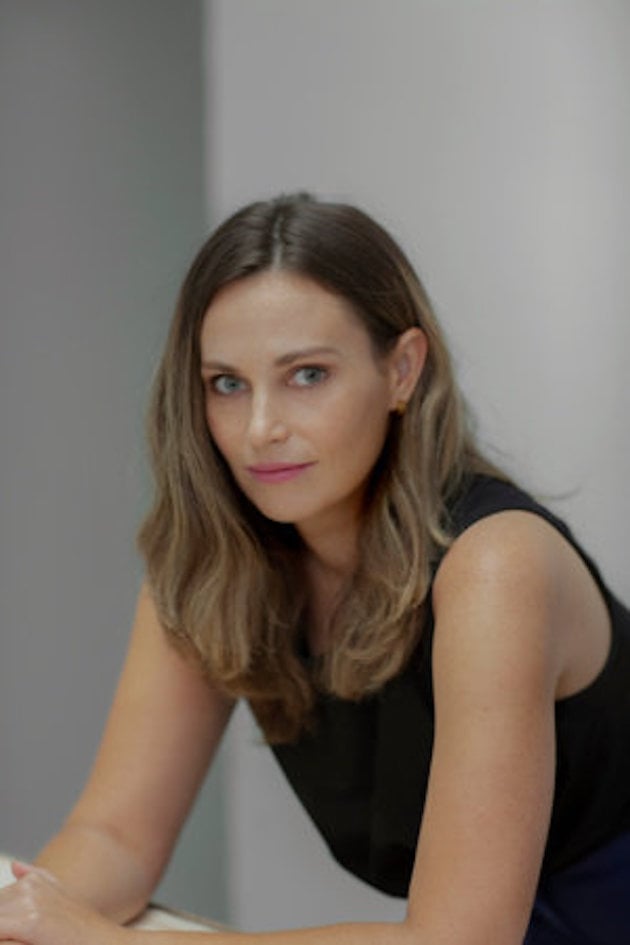
Carley Fortune (Photo: Jenna Marie Wakani)
After a whirlwind daylong adventure, Ferm and Will make a promise that one of them keeps and the other breaks. Meet Me at the Lake is a beautiful story about missed connections and second chances set against the picturesque backdrop of Muskoka.
Fortune’s writing is effortless and immersive—she is a master of dialogue and witty banter. The narrative flows from past to present, urban to rural. Through well-developed and perfectly executed backstories, Fortune shows how Fern and Will become the present day versions of themselves. She also uses diary entries to fully flesh out the character of Maggie as well as Fern’s memories in order to further explore the mother-daughter relationship which is a central theme of the book.
Although there are similarities to
Every Summer After—lake setting, the theme of grief, dual timeline—this is an entirely fresh story. Brimming with nostalgia for summers at the lake,
Meet Me at the Lake is like coming home.
CARLEY FORTUNE is an award-winning journalist who also worked as an editor at some of Canada’s top publications, including The Globe and Mail, Chatelaine, Toronto Life, and was most recently the Executive Editor of Refinery29 Canada. Carley holds a Bachelor of Journalism from Toronto Metropolitan University (formerly Ryerson University).
Carley spent her young life in the suburbs of Sydney, Australia, and in Barry’s Bay, a tiny lakeside town in rural Ontario and the setting for
Every Summer After.
Fortune lives in Toronto with her husband and two sons.
Scroll to read Girl Well Read’s exclusive interview with Carley Fortune.

@carleyfortune via Instagram
GWR: Are you a pantser/gardner or a plotter/architect? What does your writing process look like? How many hours a day do you write?
CF: I’m a pantser. Before I begin, I have a broad concept for the story, and if there’s a twist or a reveal, I might know that too—though not always. I have the vaguest sense of who my characters are, but almost everything reveals itself as I write. I love that about my process. The way scenes, dialogue, and character quirks pop into my brain often feels like magic.
Writing is my day job, and I approach it like one. As soon as my husband and kids are out the door, I get to work, breaking for lunch and (hopefully) exercise, and then am back to my keyboard until everyone gets home and chaos ensues. I tend to write my first draft quickly and without editing. But by the time I hand it in to my editors, I’ve revised the manuscript multiple times.
GWR: You have a publishing background—did this help or hinder your writing? What do you like most about the publishing process?
CF: I was a journalist for sixteen years, working as an editor at outlets like Refinery29, Chatelaine, The Globe and Mail, and Toronto Life. So much of what I’ve learned about writing and the editorial process comes from my media background and from my journalism degree: the importance of clarity, selecting telling details, the tremendous value of editors, meeting deadlines, reaching an audience, the power of a good cover, and what it means to produce something at the intersection of art, craft, and commerce.
What I love about book publishing is the extra time and attention that goes into the work, as well as the longevity of a novel compared to an article. My debut novel,
Every Summer After, came out in May of 2022, and it boggles my mind that there are still thousands of people buying a copy of the book every week. I’ve always been passionate about my work, I’ve always put my heart and soul into my job, and now I feel like it’s absolutely worth the effort. I know I’m doing what I was meant to do.
CF: Insomnia! I wrote
Every Summer After in 2020 while I was pregnant with my second child, and we sold it in a two-book deal when I was eight months pregnant. I suffered insomnia throughout the pregnancy and after I gave birth. At the same time, I had to pitch an idea for my second book to my editor. I was lying awake in the middle of the night after a feeding, trying to figure out what the heck I was going to do. So I asked myself where I wanted to be. I find that writing is like reading, in that you’re transported to the characters’ world. And I saw it immediately: a classic lakeside resort in Muskoka, and Fern, who’s reluctantly back home running the place following the death of her mom. There’s a storyline told through a series of diary entries Fern’s mom wrote in the summer of 1990, and that came to me that night as well. The love story took longer to sort out. I decided to challenge myself to do the exact opposite thing I did with
Every Summer After, where the characters fall in love over years. In
Meet Me at the Lake, I wanted to build an intense, life-altering bond in just 24 hours.
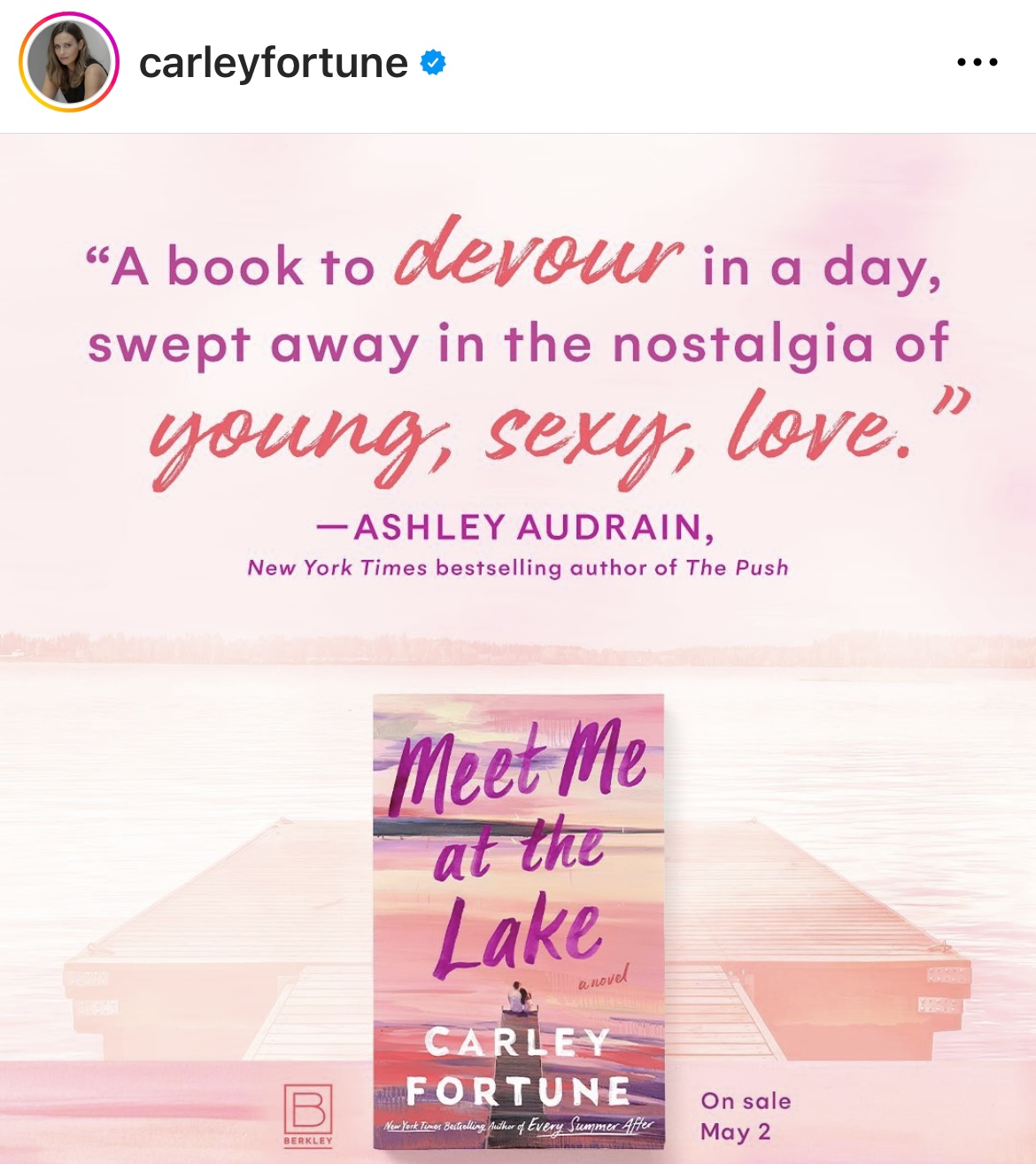
@carleyfortune via Instagram
CF: By the time
Every Summer After was published, I had already submitted the second draft of
Meet Me at the Lake. Both my editor and agent, who are tremendously talented and savvy, had suggested having the second book well underway by the time the first came out. And I’m so glad I followed their advice. I already had a massive case of self-doubt while working my second book. I was worried my ability to write
Every Summer After had been a fluke. We had big hopes for
Every Summer After, but the way it exploded was a huge surprise, at least to me. I’m sure my imposter syndrome would have been almost debilitating had I been drafting
Meet Me at the Lake when
Every Summer After became a bestseller.
GWR: Did any minor characters become major characters over the course of the novel?
CF: Yes. In my first draft of
Meet Me at the Lake, Jamie, who is Fern’s ex and the manager of the resort, was not her ex. With every draft, he took on a greater role, which was so fun, because Jamie was one of my favourite characters to write. Maggie, who is Fern’s mom, was always a major character, but since she’s recently passed away when we meet Fern in the present-day storyline, she is mostly developed through her diary entries and through Fern’s memories. The mother-daughter relationship is core to the book, and my editors helped me give it (and Maggie herself) texture, weight, and specificity with every draft.
GWR: You shift perspectives with the use of diary entries and alternate between past and present—what made you decide to write the book this way? Was it easier or more challenging to explore the parallel storyline?
CF: I love playing with time, and I enjoy books that experiment with structure and technique. I love it when characters have a history, so when I’m brainstorming, I tend to spend much of my effort creating elaborate backstories for my love interests. It feels natural for me to go back and forth between present and past storylines, and in some ways easier than writing one linear story—it’s like two short books in one, and I can pack in a lot. I’m interested in how our relationships to ourselves and others shift over time, and alternating timelines is a great tool for exploring that.
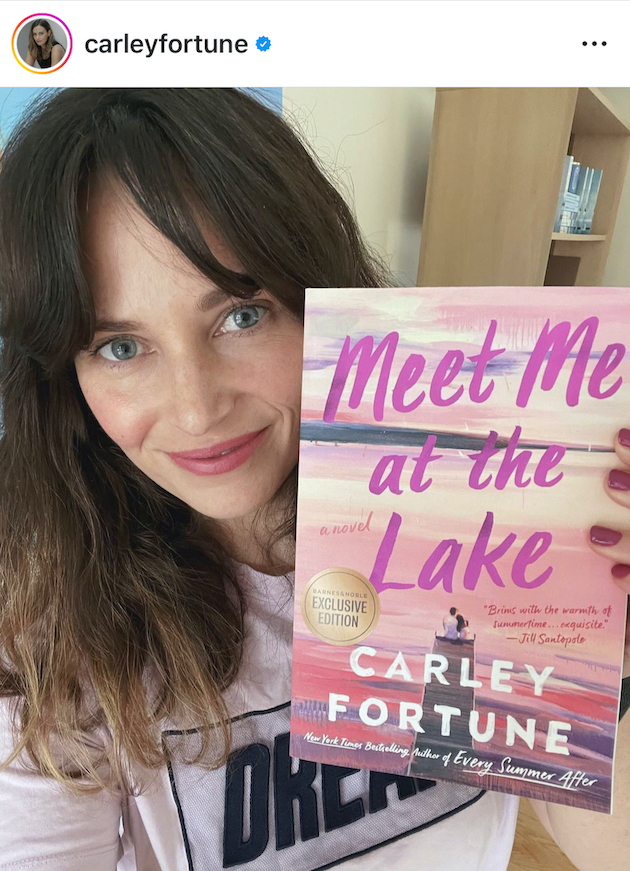
@carleyfortune via Instagram
GWR: There is strong nostalgia associated with your books for summers in Muskoka/Barry’s Bay as well as the city of Toronto—why is it important to feature these Canadian settings versus a generic US locale?
CF:
Every Summer After is set in Toronto and Barry’s Bay, which is a small town in eastern Ontario where I lived from grade four until the end of high school. Barry’s Bay far less populated than Muskoka and quite far from the city.
Meet Me at the Lake is set at a fictional resort in Muskoka and the Toronto of ten years ago.
Every Summer After began as a project that was just for me. I wanted to write about how I grew up: on a lake, in the bush, with cottagers who come and go with the seasons. But when I realized it might become a published book, I asked agents whether they thought the Canadian setting might be a problem. I got mixed feedback. Honestly: I wouldn’t have set the book in the US, but I would have made the precise location of Barry’s Bay unknowable if it meant being published. Fortunately, both my editor (who is based in New York) and my agent (who is based in LA) loved the setting, and I’m so grateful it appears the way I initially wrote it. In hindsight, I think that’s one of the reasons it resonated with readers outside of Canada—there’s an escapist element we crave in our summer reads. My favourite part of writing
Meet Me at the Lake was Will and Fern’s twenty-four hours in Toronto—I think it’s dreamy and magical and a love letter to the city the same way that
Every Summer After was a love letter to Barry’s Bay.
GWR: If your book was a beverage, what would it be?
CF: French press coffee, black, the way Fern drinks it.
GWR: What are you working on now?
CF: I’m working on my third book, which I am preposterously excited about. It’s the most fun I’ve had writing thus far, and I can’t wait to share more about it. (Hopefully later this summer!)









